Emily Lowery enrolled in an architecture course last May hoping to learn about different architecture and landscape design solutions.
She walked out as part of a team of students who would design the University of MinnesotaâÄôs first ever ecologically friendly bike pasture âÄìâÄì a combination of bike parking, social space and a garden.
The course, Architecture and Landscape: Modeling Zero Energy/Zero Impact, is one of several offered through the collegeâÄôs Zero Plus Campus Project. It encourages students to explore ways to move the University towards a zero-emissions, zero-energy and zero-waste campus through interdisciplinary approaches to design.
The curriculum called for students to design and install a demonstration garden as a class project, but Lowery and her classmates came up with another idea.
âÄúWe werenâÄôt thinking outside of the box enough, and the bike pasture idea came about,âÄù Lowery said.
The group of students worked together to redesign the bike parking outside Rapson Hall into an area that would combine it with a garden and a social space.
The bike pastureâÄôs $15,000 cost was a concern for some members of the Minnesota Student Association, who funded the project. The group worried the pasture was taking a large chunk of programming expenses.
But President Eric Kaler approved the funding after a meeting with MSA president Lizzy Shay and Phillip Kelly, MSAâÄôs director of facilities, transit and housing, two weeks ago.
âÄúWe had sent over documents to the administration beforehand about what the bike pasture was, and it approved by Kaler within the first minute of conversation,âÄù Kelly said.
Kelly said historically, MSA received $15,000 from the presidentâÄôs office for various projects. That money was typically given to the âÄúLend a Hand, Hear the BandâÄù project, but that program was no longer seen as economically viable by the administration, and the pasture was chosen as an appropriate replacement.
Kelly said the funding is a launching point for a new program called Improve U, which the MSA has come up with for students who want to receive funding for similar projects.
âÄúEssentially with this new program, students will be able to apply for funding for all sorts of projects, whether it would be something with art or sustainability, and MSA would pick the best ideas and provide these funds for the students,âÄù Kelly said.
Elizabeth Turner, a research graduate student in the College of Design, headed the project with Lowery and said the idea for combining the three elements came about organically.
âÄúThe bike parking encircles the social space and encourages students to go and hang out in the area where previously it hindered the space,âÄù Turner said.
The group also plans to bring in natural plants to create rain gardens in the area in hopes that during storms, the water will go into the soil instead of into sewers.
Turner and the student design team are now working on choosing the most ecologically friendly materials for the pasture and already have a design in place.
âÄúRight now, we are researching what kind of pavers and stone that weâÄôre going to use and are even thinking about doing crushed stone because thatâÄôs the most ecologically friendly choice,âÄù said Turner.
The chairs for students in the social space will be made out of recycled milk bottles.
Turner says the team has been working closely with Parking and Transportation Services and the UniversityâÄôs landcare team to make design decisions.
The team is aiming for the project to be finished and open for use on Beautiful U Day in the spring.
âÄúIâÄôm hoping that the pasture catalyses more similar projects on campus that cross disciplinary boundaries and that make our campus more sustainable and beautiful,âÄù Turner said.


